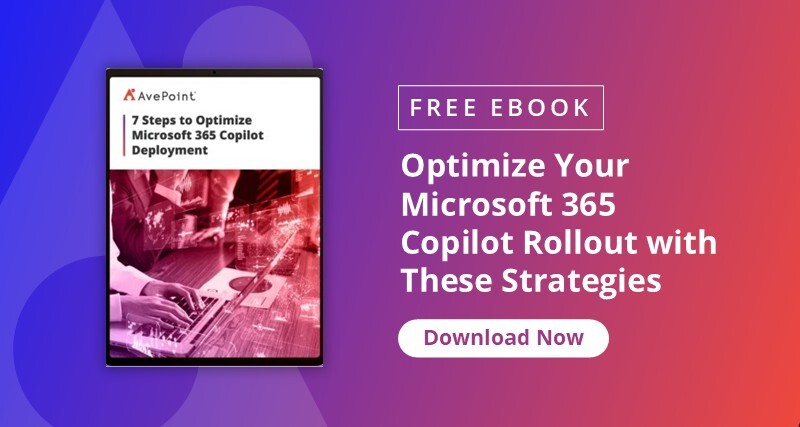TL;DR: How do you get more value from your Copilot license? By opening up more data.
You’ve likely encountered the dreaded “Sorry, you don't have access.” message when attempting to open a shared document. What about all the documents Copilot could use to deliver valuable insights, but can’t because of overly restrictive permissions? The fact is, a large proportion of documents are incorrectly permissioned, limiting your organization’s ability to benefit from cross-team collaboration and knowledge reuse.
While sensitive areas represent a small fraction of a customer’s total content, a larger proportion of workspaces could be shared more broadly to foster knowledge collaboration. However, they are frequently locked behind overly restrictive permissions due to default settings, lack of governance, or protective access policies.
At AvePoint, we have helped hundreds of clients migrate their data to Microsoft 365. As organizations prepare for tools such as Microsoft Copilot, which leverage large language models (LLMs), there’s a renewed emphasis on data governance. This includes protecting data integrity, managing permissions, and enforcing lifecycle management.
While these measures are critical for safeguarding sensitive information, there’s a different perspective to consider: organizations should adopt a more open approach to permissions. By prioritizing accessibility for most content and applying restrictions only when absolutely necessary, they can unlock greater collaboration and knowledge reuse. Otherwise, restrictive permissions applied to content stifle knowledge sharing, limit collaboration, and undermine the full potential of tools like Copilot.
The Paradox of Overly Restrictive Permissions
The push to secure data in Microsoft 365 environments is understandable, particularly as organizations prepare for AI-driven tools that rely on accessing and processing vast datasets. However, the default position in many organizations has been to lock down content excessively. This often restricts access to documents, project files, and shared resources to a limited group of users.
Consider a client engagement created in a Microsoft Team channel. Access is typically restricted to project team members, preventing employees on similar projects from Copilot’s ability to analyze and research. In reality, a relatively small percentage of content is truly sensitive. The majority, found in general project or corporate repositories, hold no sensitive information and could be reused to drive efficiency.
While it might seem convenient to add the "all_company" group to every Team for broad access, this approach can negatively impact usability and navigation. Users’ Teams interfaces may become cluttered with numerous teams, making it harder to find relevant content and collaborate efficiently.
This creates a paradox: organizations invest in advanced AI tools to boost productivity, but constrain their effectiveness by overly securing data. This limits Copilot’s ability to deliver meaningful insights, essentially paying for a tool that can’t reach its full potential.

Recommendations for Smarter Data Sharing
To balance security with while maintaining appropriate level of cross-team collaboration, consider the following recommendations:
1. Adopt a collaboration-first model. Shift permissions to a collaboration-first approach, prioritizing broad access for general use cases to enhance cross-team cooperation.
2. Establish clear collaboration criteria for sensitive departments. Set clear collaboration criteria for departments that have unique permission requirements and must safeguard their information (e.g., financial reporting, legal, HR, compliance, etc.)
3. Implement a granular permissions model for Microsoft Teams. Depending on the sensitivity of the content, break inheritance at the SharePoint library level and add the "all_company" group to the reader role on specific document libraries. This approach lets you share only the necessary libraries with the entire company while keeping the rest of the Team’s content and conversations restricted. Provisioning framework should allow owners to opt out of this request and be visibly displayed if security change is approved.
4. Create a permissions model for standalone SharePoint sites. Add the "all_company" group to the reader role. This allows users to access these sites directly via a browser without affecting their Teams navigation, making it ideal for sharing broadly relevant content. Similar to the previous recommendation, provisioning framework should allow owners to opt out of this change and be visibly displayed if security change is approved.
5. Implement automated scanning for sensitive data. Use an automated process to scan for content that has sensitive information (e.g., client names, financial information) and adjust permissions to an appropriate level.
The Future of Collaboration is Open (and Secure)
Microsoft 365 offers immense potential for knowledge reuse, especially when paired with AI tools like Copilot. However, this is only possible if users can access the right information at the right time.
By shifting toward a collaboration-first mindset and implementing thoughtful permission strategies, organizations can strike the right balance between security and accessibility. The result will be better-informed employees, faster project delivery, and a greater return on your Microsoft 365 investment.
It's time to stop defaulting to “no access” and start designing for smarter, safer, and more open knowledge sharing. The result will be better informed employees, faster project delivery, and greater return on your Microsoft 365 investment.
Are you ready to unlock Copilot’s true potential?


